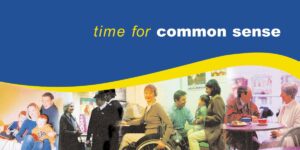According to the Labour Party website the Labour Party will try to achieve the following if they retain power at the 2010 general election on May 6th:
If Britain is to thrive in the modern globalised high skill economy we cannot afford to take our foot off the pedal of driving standards in schools, on opening out opportunities for young people to study, to train or to do an apprenticeship. We have driven huge improvements in the number of young people training, and in the standards of education across the board.
We have more than doubled spending per pupil in frontline schools spending – and there are 42,000 more teachers than in 1997. And we are committed to protecting frontline school spending, as well as frontline spending on Sure Start and 16-19 education as we take tough decisions to cut the deficit. We have seen some of the best ever exam results at every age. But Labour believes there is a choice. We believe that government needs to go even further to support teachers, pupils and parents to improve our schools even more. We should be proud of the achievements of teachers and pupils, but we cannot be satisfied because we still believe that too many children are not achieving the results they could – and too many schools have discipline that falls short of excellent.
That is why our guarantees of one to one tuition and catch support including small group work for children who are falling behind their potential is designed to build on the improvements of the last decade by making education personal to all – helping them improve when they are falling behind their best and stretching them when they can excel. At the heart of our new guarantees is a 3Rs guarantee for primary school pupils . This provides:
* Catch-up and one-to-one tuition for pupils who start primary school behind
* One-to-one tuition for any pupil still not making progress at age seven
* And catch-up help including one-to-one tuition provision for any pupil starting secondary school having not mastered the basics in primary.
This is all to back up world class all class teaching.
In primary schools we are also making the curriculum more engaging for pupils – for example through the introduction of specialist language teachers and also specialist maths teachers. Extended schools allow kids to access a wide range of after school activities and clubs.
Whilst thousands of schools have improved across the board we want to build on that by ensuring that good behaviour and decent minimum GCSE results are achieved in every school. All schools who currently fall below our minimum benchmark of 30 per cent of children receiving 5 grades A*-C at GCSE including English and Maths are being given extra funding and support but are being asked to exceed this benchmark by 2011 or face intervention which could include being converted to an academy. Already the number of schools falling below this benchmark has gone from more than half in 1997 to less than one in thirteen schools.
These days very few schools at all fall below “satisfactory” standards of behaviour when they are inspected by the schools inspectorate, Ofsted. But we think satisfactory is not good enough. We are challenging schools who are not achieving discipline rated “good” or “excellent” at minimum by inspectors. Schools which in the coming years are falling below this level or are not making good progress towards it will face intervention – we know what works on behaviour: clear rules, swift enforcement including the removal of disruptive pupils and things like uniforms. There is no excuse for schools having poor behaviour.
We believe that support is vital for parents in the crucial early years of a child’s life. We are offering parenting support and childcare which enables parents to work and train, advice and healthcare in a flexible and all-round setting. In order to deliver this, since the late 1990s we have been rolling out Sure Start Children’s Centres, and since 2005 we have been working to open a Children’s Centre in each community – a target we hit in March 2010.
The competitive global economy of the future will see countries compete in high skill, high technology markets. We cannot afford to waste the talents of any of our young people. Despite other parties arguing that it is wrong to set ambitious targets for bringing young people into Higher Education. Labour will continue to aim to see half of all young people getting into university and we want 75 per cent of all young people by 30 years old to have achieved an advanced apprenticeship, equivalent qualification, or have attended university. Labour will provide 20,000 extra undergraduate places on courses starting in 2010-11.
And, despite opposition from opposition parties we remain committed to ensuring that by 2015 we have raised the age at which young people will leave compulsory training or education to 18. Today we are guaranteeing every young person who wants it the right to an offer of a training place, an apprenticeship or a place in education until they are 18 – and for everybody under 25 we will guarantee funding until they have achieved a level 3, or A level equivalent qualification.
Labour’s record
* Spending per pupil in frontline schools spending has risen from an average of£2,970 in 1997/98 to £6,130 in 2009/10, more than doubling in real terms.
* There are 42,400 extra teachers and 212,000 more support staff – including an extra 123,100 teaching assistants – than in 1997.
* We have some of the best ever school results at every age;
* At primary school the percentage of pupils achieving level 4 (the expected level) or above in 2009 was in English 80 per cent compared with 63 per cent in 1997 in Maths 79 per cent compared with) and 62 per cent in 1997 and in Science 88 per cent compared with 69 per cent in 1997.
* Around 100,000 more children now leave primary school secure in the basics than in 1997.
* 64.8 per cent of pupils achieved 5 or more grades A*-C at GCSE or equivalent – an increase of 19.7 percentage points since 1997. Over 129,000 more pupils achieved 5 or more A*-C grades at GCSE or equivalent than did so in 1997.
* 47.6 per cent of pupils achieved 5 or more grades A*-C including English and mathematics at GCSE or equivalent – an increase of 1.3 per cent percentage points from 2006/07. This means just over 78,000 more pupils achieved 5 or more A*-C grades at GCSE including English and maths than in 1997.
* In 1997 half of all schools did not achieve 30 per cent of pupils leaving with five A*-Cs at GCSE, including English and maths now it is just 1 in 12. We are investing £400m in our National Challenge to ensure that every school will have at least 30 per cent by 2011.
* Record numbers of young people are achieving their goal of going to university, 392,000 more than in 1997 over 2 million
* Ten years ago there were no Sure Start centres at all. Now there are now 3,500 round the country, benefitting more than 2.7 million families. Nine out of ten parents using children’s centres are happy with the services they receive.
* In 1997 there was no free childcare entitlement. Today all 3 and 4 year olds have at least 12.5 hours and all will have 15 from this September.
Labour Party Education Policy :http://www.labour.org.uk/policies/education
I would be interested to hear both positive and negative views on Labour’s Education policies in the comments below?
Copyright ©, The Labour Party, 39 Victoria Street, London SW1H 0HA. All rights reserved. Any rights not expressly granted herein are reserved.














Re: education policy
Young people, young people, young people! Is that all you care about?
What about all the adults who lose occupations through redundancy and other situations in their lives. And, yet you are cutting back on adult education, no end. Shame on you!
And, how do you expect FE tutors to care for 14 year olds in adult environments? That is just totally ludicrous and irresponsible. Adults who enter colleges do not undertake CRB checks and could be mingling with youngsters with no restrictions. Further more, adult ed. tutors are not trained in the physiological & psychological developments of children. The odd, compulsory staff dev. session on this topic is just an insult to the training our secondary school teachers have to undertake to work in our schools.
I think Labour have ‘lost the plot’ as for as education goes. And your ‘testing, testing, testing’ approach to out children is also insane. Image taking a test as a 6 year old. How would you feel?
The damage you have done needs repairing, and now.
Regards, Ann